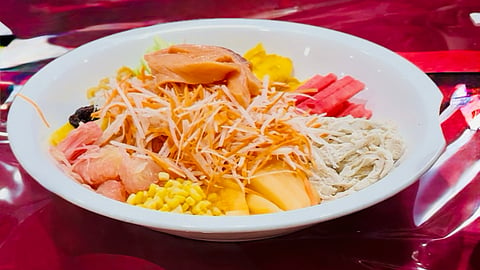
- NEWS
- the EDIT
- COMMENTARY
- BUSINESS
- LIFE
- SHOW
- ACTION
- GLOBAL GOALS
- SNAPS
- DYARYO TIRADA
- MORE

The Malaysian Ambassador’s residence in Manila was abuzz with celebration Sunday as guests gathered to mark Chinese New Year as the vibrant Yusheng dish, a colorful medley of shredded vegetables, sauces and crispy toppings, took center stage.
Guests raised their chopsticks and joined in the traditional prosperity toss (lo hei), creating a joyous atmosphere of shared laughter and anticipation for the year ahead. The event served as a reminder of the deep cultural ties that bind Malaysia and the Philippines.
Both nations, with their rich diversity, share a common thread in their Chinese communities, where the Spring Festival is celebrated with hope, prosperity and unity.
In the Philippines, this influence is evident in the bustling streets of Binondo, Manila, in the diverse culinary offerings, and in traditions that have become ingrained in everyday life.
This shared cultural heritage is mirrored in Malaysia, where Chinese culture plays an integral role in the nation’s fabric. The Chinese New Year celebration highlighted this connection, symbolizing the shared values and experiences that unite the two Southeast Asian nations.
Beyond cultural celebrations, the Philippines is actively strengthening its trade and investment relations with Malaysia, focusing on key sectors such as semiconductors, logistics and electronics.
Recently, Philippine Trade Undersecretary Ceferino Rodolfo traveled to Kuala Lumpur to outline key areas of collaboration with Malaysian businesses.
Among the Malaysian companies engaged in the talks was Rohas-Euco Industries Berhad, a global leader in power and telecommunication infrastructure. Rohas-Euco is exploring opportunities in transmission tower projects within the Philippines, signaling potential investment in the country’s infrastructure development.
The Malaysian International Chamber of Commerce and Industry (MICCI) was also represented at the meetings. MICCI president Christina Tee emphasized the importance of mentorship programs to help businesses scale and inspire micro, small and medium-sized enterprises (MSMEs) to expand their reach.
Tee highlighted the potential for Malaysian businesses to share their expertise and support the growth of Philippine MSMEs, fostering stronger economic ties at the grassroots level.
In the logistics sector, MICCI executive director Lee Han Ling cited the significant untapped potential for collaboration between Philippine and Malaysian firms, particularly in warehousing.
He pointed to opportunities for joint ventures and partnerships that could improve efficiency and boost trade between the two countries.
Tee also underscored the need for three key elements for successful business expansion: access to materials, readily available labor, and strong local partnerships. These factors are crucial for Malaysian companies looking to invest in the Philippines and for Philippine businesses seeking to collaborate with Malaysian counterparts.
